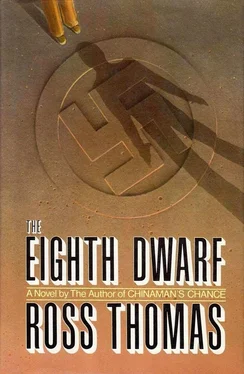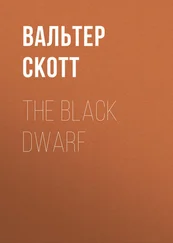“No,” Ploscaru said.
“Say something else — in German.”
“What would you like me to say?”
The man studied Ploscaru for a moment and then smiled. “Of course. Romanian. Am I right?”
“You’re right.”
“From Bucharest, I’d say. Your vowels give you away. I’m ever so proud of myself. I thought I might have lost the touch.” He smiled again with teeth that were too regular and too white. Jackson decided they were false. He tried to guess the man’s age and settled on forty, although he felt he could be off ten years either way.
“Do you have names?” the man said, still smiling.
“Mine’s Jackson; his is Ploscaru.”
“Jackson and Ploscaru. Well. I am Gloth, but you know that, don’t you? My little treasure told you, the one who took your money. But then remorse set in — and guilt She really quite adores me, you know. So she sped back here as quickly as she could and told me all. Naturally, I forgave her, and we wept together and embraced and did other most interesting things and then I waited for you to arrive. Are you always so clumsy?”
“Almost always,” Jackson said.
“Really? How interesting. Now I have to decide what to do with you.”
“Why not just let us go?” Ploscaru said. “We’ll pay you, of course, and then forget we ever met.”
“You have money?”
“Some.”
“Then I will take it from you after I kill you. You realize that’s what I’m going to have to do.”
“We didn’t,” Jackson said.
“Oh, yes. I really have no choice. That’s what I told my little treasure just before — but no matter. I would like to continue our chat, gentlemen, but it has been such a long evening. I think we’ll go down to the cellar now and do what must be done. If you’ll keep your hands on your heads and turn right, you’ll see another door. We will go through that. You, Herr Ploscaru, will open the door and switch on the light — it will be just to your left. Then you will put your hands back on your head. Shall we go?”
Gloth waved the machine pistol at them. Jackson and Ploscaru moved over to the door. Ploscaru opened it, found the light, and switched it on.
“Hands back on your head, please,” Gloth said.
Ploscaru put them back.
“Now slowly, gentlemen, ever so slowly. I suppose I should tell you that I’m an extremely good shot.”
“We believe you,” Jackson said.
“Down the stairs now — you first, Herr Jackson.”
Jackson started down the concrete stairs. Light came from a single bulb that hung from an insulated wire. Jackson thought about jumping for it and smashing the light with his hands. But it was too high, he decided — almost four feet too high.
When they reached the beginning of the last four steps, Ploscaru stumbled and took his hands from his head to try to catch the banister. He missed and fell headlong down the steps, landing in a crumpled heap. He groaned and twisted around, his hands clutching his stomach.
Jackson started toward him. “No, Mr. Jackson,” Gloth snapped. “Move back and keep your hands just where they were.”
“He’s hurt,” Jackson said, but did as he was told.
“He won’t suffer long,” Gloth said, and came slowly down the steps.
He nudged Ploscaru with his foot. “Get up. You can get up.”
Ploscaru groaned again and got slowly to one knee.
“Now all the way up,” Gloth said.
With his hands still clutching his stomach, the dwarf began to rise slowly. He groaned once more, quite horribly this time, then whirled. The commando knife was in his right hand. He plunged it into Gloth just above the groin. Gloth screamed and dropped the machine pistol. He clutched at himself as Ploscaru pulled the knife out. Gloth doubled over, and the knife went back in with a hard, upward thrust. Ploscaru jumped away. Gloth stared down at the knife hilt that poked out of his chest, just below the rib cage. He screamed again — a shrill, frightened scream; tugged at the knife; fell to his knees; screamed yet again; and toppled over. He died then, or shortly thereafter.
Jackson found himself fumbling for his cigarettes. He lit one, dragged the smoke deep down into his lungs, and blew it out. He noticed that his hands were trembling.
“I liked the way you groaned.”
“Yes,” Ploscaru said. “I thought I sounded quite distressed.”
The dwarf reached down, grasped the hilt of the knife, and pulled it out. He stared at it for a moment with distaste, or perhaps revulsion, and then wiped its blade off carefully on the dead man’s trouser leg. When satisfied that it was clean, Ploscaru tucked the knife back into the silk sheath that was sewn into his coat sleeve.
“You always keep it there?” Jackson said.
“Not always, Minor. Just upon occasion.”
Jackson bent down and picked up the machine pistol. He examined it carefully and then looked at Ploscaru. “The safety was on.”
“Didn’t you notice?”
“No.”
“What did they teach you at OSS?”
“Not enough, I’d say.”
Ploscaru found his cigarettes and lit one. Jackson noticed that there was no tremor in the dwarf’s hands as he stood smoking calmly and gazing thoughtfully around the cellar.
“I think this will do quite nicely, don’t you?” the dwarf said.
“For what?”
“For Oppenheimer.”
Ploscaru stepped over to a heavy door and opened it He glanced inside the room, moved back quickly, and slammed the door. When he turned, his face was pale and stiff.
“What was it?” Jackson asked.
“The girl — his maid. No need to look. She’s dead. It’s rather nasty.”
Jackson shook his head and looked down at the dead Gloth. “I wonder who he really was.”
“You can ask Oppenheimer,” Ploscaru said, opening another door. “He’ll know.”
The dwarf inspected another room whose door he had just opened. “This one will do,” he said. “Take a look.”
Jackson went over to look. It was a small, bare room with no windows. A weak bulb provided what light there was. Ploscaru examined the door, which had a small opening covered by iron mesh. The door was made of heavy, solid wood, with a large steel lock. Ploscaru turned the key back and forth, testing the lock. “This will serve quite nicely.”
“What do we do with him?” Jackson said, nodding at Gloth.
“Drag him under the stairs.”
“Let’s do it, then.”
Afterward, they started up the stairs. Halfway up, the dwarf paused and turned. “You know,” he said slowly, “it really wasn’t such a bad scheme.”
“Which one?”
“Gloth’s. Perhaps we should see how it works on Oppenheimer.”
“You think he’s as stupid as we are?”
“Possibly,” the dwarf said. “Many people are.”
Bodden was glad to get off the borrowed bicycle. The ride from the Gasthaus had done his knee no good. He stood across the street from 14 Mirbachstrasse and studied the large, dark house. There was nothing to see — only a big house surrounded by a high wall.
Bodden looked up at the moon and tried to guess the time. It had been about a quarter past three when the boy had brought the note from Eva Scheel. Bodden had then had to rouse the Gasthaus proprietor to borrow the bicycle. The ride had taken another quarter of an hour — possibly twenty minutes. That made it almost four — perhaps a quarter to. The burglar’s favorite hour.
The first thing Bodden needed was a place to conceal the bicycle. There was a clump of shrubbery — evergreens of some sort. He wheeled the bicycle over and leaned it against the shrubs. And now you, printer, he thought; some place where you can get off your leg and sit down and watch. There was a large tree not far from the shrubbery. He could lie or sit behind it and still have a view of the gate that led to the house.
Читать дальше












